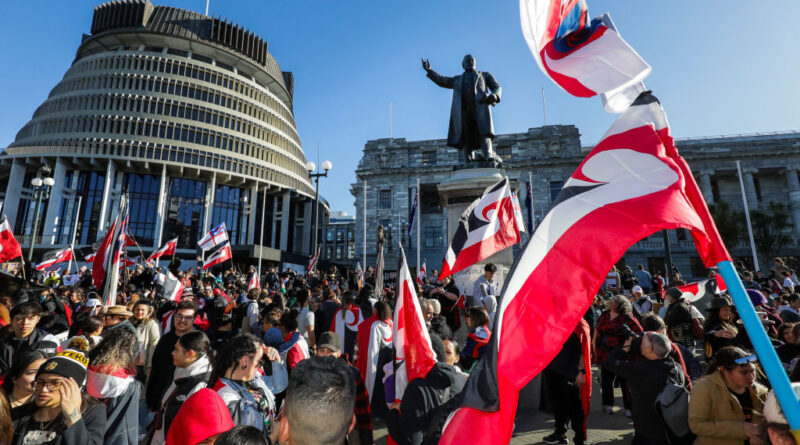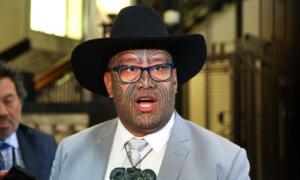The New Zealand Parliament Website Crashes Due to High Volume of Submissions on Controversial Race Bill
The Treaty Principles Bill, designed to safeguard the impact of the Treaty of Waitangi on legislation and policy, has sparked nationwide protests.
The deadline for public feedback on the contentious Treaty Principles Bill in New Zealand has been extended by a week due to overwhelming submissions causing the parliament website to crash.
Initially suspected to be a DDOS (distributed denial of service) cyber attack, it turned out that most individuals submitted their responses in the final two days, resulting in 300,000 submissions within a 48-hour period.
As a result, the Justice Select Committee has agreed to reopen submissions from 1 p.m. on Jan. 9 to 1 p.m. on Jan. 14. The original deadline was set for 11.59 p.m. on Jan. 7.
What is the Issue?
The crux of the matter is a proposed bill aiming to define the principles of the Treaty of Waitangi.
Signed in 1840, the Treaty constituted an agreement between the British Crown and numerous Māori chiefs as a foundational pact for the nation.
Initially inconsequential in lawmaking or the courts, the Treaty has gained significance over recent decades in shaping the Crown’s relationship with Māori.
However, due to the lack of clear definition of its principles, compounded by translation discrepancies between versions, the Waitangi Tribunal has been tasked with interpreting their scope through various judgments, effectively elevating Māori to equal partners with the Crown.
The Treaty Principles Bill, proposed by the ACT Party, aimed to specify the principles in law and supersede common law.

New Zealand’s libertarian ACT Party leader David Seymour speaks during question time at Parliament in Wellington, New Zealand on March 6, 2024. Hagen Hopkins/Getty Images
Opposition to the Bill
Despite this, the Bill has faced significant opposition and criticism unlike anything in recent New Zealand history. When it passed the first reading last year, tens of thousands marched across the country to protest against it, with an estimated 42,000 people rallying at Parliament.
Labour’s spokesperson for Māori development, Willie Jackson, highlighted the concerted effort to drive submissions close to the deadline.
“This is the most … anti-Māori kaupapa [set of principles] we’ve had to deal with in the last generation,” he remarked.
The previous record for parliamentary submissions was 107,000 received for the Conversion Practices Prohibition Legislation Bill in 2021, which prohibited attempts to alter or suppress someone’s sexual orientation, gender identity, or gender expression through particular practices.
Clerk Says Parliament Was Prepared for Load
Technical experts suggest that the website issues at Parliament could stem from government budget cuts affecting the entire public service, pointing out that investing in additional servers could have prevented the crash.
The Clerk of the House, David Wilson, indicated that Parliament had anticipated a heavy load on its IT infrastructure.
“The Office of the Clerk is aware that the unprecedented volume of submissions being made simultaneously caused issues for the Parliament website and submission portal,” he stated in a release.
“While we anticipated a high volume of submissions and had made improvements to deal with them—within the constraints of the current architecture—the amount of traffic was even greater than expected.”
He mentioned that his office was not mandated to make any savings from its baseline in Budget 2024.
If hypothetically passed, the Bill would trigger a referendum, an essential step according to party leader David Seymour as “New Zealanders as a whole have never been democratically consulted on these Treaty principles.”
The ACT’s draft principles emphasize protecting “land and property rights” and ensuring all New Zealanders are “equal under the law.”
Prior to reaching Parliament, the Bill faced opposition from Ministry of Justice officials responsible for preparing Regulatory Impact Statements for proposed legislation.
They contended that while introducing the bill could have some merit, maintaining the status quo would be more beneficial, arguing that altering long-standing common law would introduce uncertainties into constitutional frameworks.
The Waitangi Tribunal also issued two interim reports calling the Bill the “worst, most comprehensive breach of the Treaty in modern times.”
Much of the public opposition revolves around concerns that the Bill aims to alter the Māori-Crown relationship without consulting Māori, one of the Treaty’s signatories.
Prime Minister Christopher Luxon defended allowing the legislation to reach the Select Committee stage.
“Honestly, people are focused on the economy, they’re focused on law and order, they’re focused on public services,” he commented.
“…we have a compromise, that’s reflected in the coalition agreement.”





